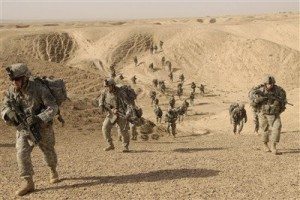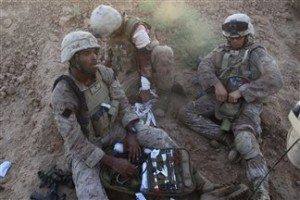In the final analysis, the military is all about blood. Wars are waged in the field of blood. We ask our soldiers to be disposed at any time to shed their blood for our country. So impressive is this great sacrifice that we can figuratively say that in the young soldiers’ veins, flows the blood of the nation.

When soldiers go to war, they receive that “red badge of courage” which is the true test of their dedication. And when they die, we pray that their blood be not shed in vain.


So strong is this blood in war that the war bond itself becomes as if a blood bond. Who cannot but reflect upon the words of King Henry V’s St. Crispin’s Day Speech:
We few, we happy few, we band of brothers;
For he to-day that sheds his blood with me
Shall be my brother
In the great trials of war, these “brothers” are immersed in each other’s blood. They fight amidst the blood of both friend and foe. They nurse each other’s bloody wounds. Each depends upon the other to give their blood for their brother next to them in a sublime act of self-denial.
Indeed, does not the Gospel say that greater love hath no man than he who lays down his life for another?
However, there is one thing that this blood asks: that it not be tainted.
Often, soldiers are not saints but there are certain acts that dishonor that blood which they shed. These are certain vices that destroy the cohesion that unites their blood as one. Treason, disloyalty, dishonesty and cowardice are certainly among these. Yet another is unnatural vice that puts a disordered sexual relationship in the place of that disinterested bond between soldiers And thus, the battle over the inclusion of homosexuals in the military is about blood. We can say that figuratively this blood that unites soldiers as brothers is tainted by introducing the possibility of this relationship in the ranks which demand the disinterested and total trust of a brother.
And thus, the battle over the inclusion of homosexuals in the military is about blood. We can say that figuratively this blood that unites soldiers as brothers is tainted by introducing the possibility of this relationship in the ranks which demand the disinterested and total trust of a brother.
However, on a much lesser level, we can say that the military is physically about blood since it would introduce into the military a group with high-risk blood contagion. This is so true that current FDA policy will not accept homosexual men as blood donors.

In addition, medical officials note that there is exposure to drug-resistant diseases circulating in the homosexual population such as hepatitis C, antibiotic-resistant gonorrhea, or various strains of herpes.
The irrefutable danger involved in this contagion should alone be enough to exclude homosexuals from the military’s battlefields of blood. However, the homosexual lobby is trying to downplay this danger and is even seeking to lift this ban citing better testing methods – a move many doctors oppose as far too risky to lift. Despite political pressure to lift it, the FDA has recently voted to retain the ban since no one can deny that men who have sex with men (MSM) are a significant risk. Only recently, the Centers for Disease Control (CDC) released a study which found that the rate of new HIV diagnoses among MSM was 44 times higher than among other men and the rate of primary or secondary syphilis 46 times that of other men.
Thus, by exposing men in close quarters to occasions of contagion, we will be introducing yet another danger which will add to that of the enemy on the battlefield. However, worse yet, we will be symbolically injecting bad blood into this bond of brothers that must have total trust.
We ask our soldiers to shed their blood for our nation. They have the right to ask that their blood not be tainted.


